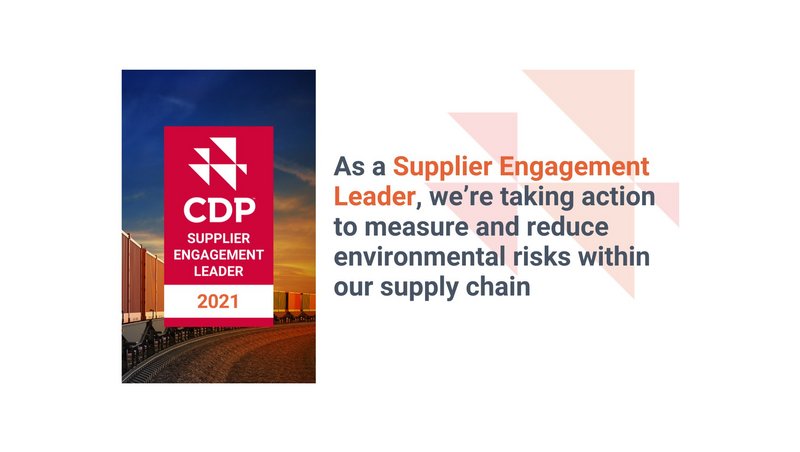Continental Once Again with Top Performance in International Sustainability Rating
- Carbon Disclosure Project (CDP) honors Continental for performance on climate change mitigation for the fourth year in a row
- Top grade for efforts to create more sustainable supply chains that conserve resources and promote important climate protection goals
- Group Sector Tires shows in various projects how environmental risks and emissions can be minimized along the entire value chain
Hanover, Germany, March 11, 2022. For 2021, Continental was awarded the highest grade by the Carbon Disclosure Project (CDP) for the fourth time in a row as a global leader in the implementation of measures and strategies to reduce emissions in the supply chain ("Supplier Engagement Rating"). This makes Continental one of the eight percent of companies that have been awarded 2021 leadership status by the international non-profit organization CDP for supplier commitment to climate change. In all, more than 13,000 companies and organizations worldwide were considered. The assessment is based on data provided by the respective companies on corporate governance and Scope 3 emissions as well as on supply chain management as a whole. CDP pays particular attention to strategies and measures that help to make environmental risks and emissions measurable along value chains in order to minimize them. Continental's holistic approach of working closely with its suppliers to achieve comprehensive improvements by involving as many stages of the supply chain as possible was recognized.
“We look at the entire value chain of our products, from material sourcing to recycling. This is the only way we can achieve truly sustainable supply chains that conserve resources and support important climate protection goals at the same time. Continental’s goal is to achieve fully sustainable supply chains by 2050 at the latest,” says Claus Petschick, Head of Sustainability at Continental Tires. “We’re involved in many projects and initiatives to integrate suppliers into our supply chains. Innovative technologies and digitalization are the primary tools we use to make environmental risks transparent and to reduce these risks within our complex supply chain.”
Projects of Group Sector Tires demonstrate a holistic approach to sustainability
To minimize environmental risks and emissions in its natural rubber sourcing, Continental has defined clear responsibilities and obligations for all parties involved in its sourcing policy. Continental also employs third-party partners to evaluate its suppliers based on verified self-reports. For example, since 2017, Continental has been working with EcoVadis, the world’s leading provider of sustainability ratings for companies and global supply chains.
In other projects, such as a collaboration with the German development organization Gesellschaft für Internationale Zusammenarbeit (GIZ), the company has been promoting a digital system for the traceability of natural rubber from the project region in Indonesia’s West-Kalimantan on Borneo since 2018. By optimizing the supply chain and offering training in the sustainable cultivation of natural rubber, smallholders are able to increase quantities, quality, and yields, thereby improving their incomes. A cultivation strategy based on sustainability also prevents logging and deforestation, conserving valuable resources. Following a successful pilot project, the number of smallholders integrated into the main project is expected to increase from 450 to around 4,000 by 2024.
The use of sustainable raw materials for tire construction and the commitment to their production and processing have long been a high priority at Continental. For example, Continental and its partners are intensively researching in Anklam (Mecklenburg-Western Pomerania, Germany) the industrialization of the use of so called Russian dandelion (Taraxacum koksaghyz) for the extraction of natural rubber. In the future, the aim is to be able to grow part of the natural rubber required close to the company's own tire plants in order to reduce CO2 emissions caused by long transport routes and to conserve valuable resources. The use of sustainable raw materials also includes the use of recycled polyester from recycled plastic bottles, which Continental is currently introducing into the series production of its tires, as well as the use of silicate from the ash of rice husks, an agricultural waste product. Plant-based oils and resins also reduce the proportion of crude oil-based materials already today. Continental's goal is to successively use 100 percent sustainably produced materials in its tire products by 2050 at the latest.
Continental has been participating in the annual reporting and disclosure of climate protection-relevant data for the CDP assessment for more than ten years. In addition to top rating for supply chains, the company was honored with a “B” rating for its efforts in the field of climate change mitigation. In the category of sustainable water management, Continental’s actions and data also scored a “B.”

Henry Schniewind
Leiter Externe Kommunikation Tires
Continental Tires


